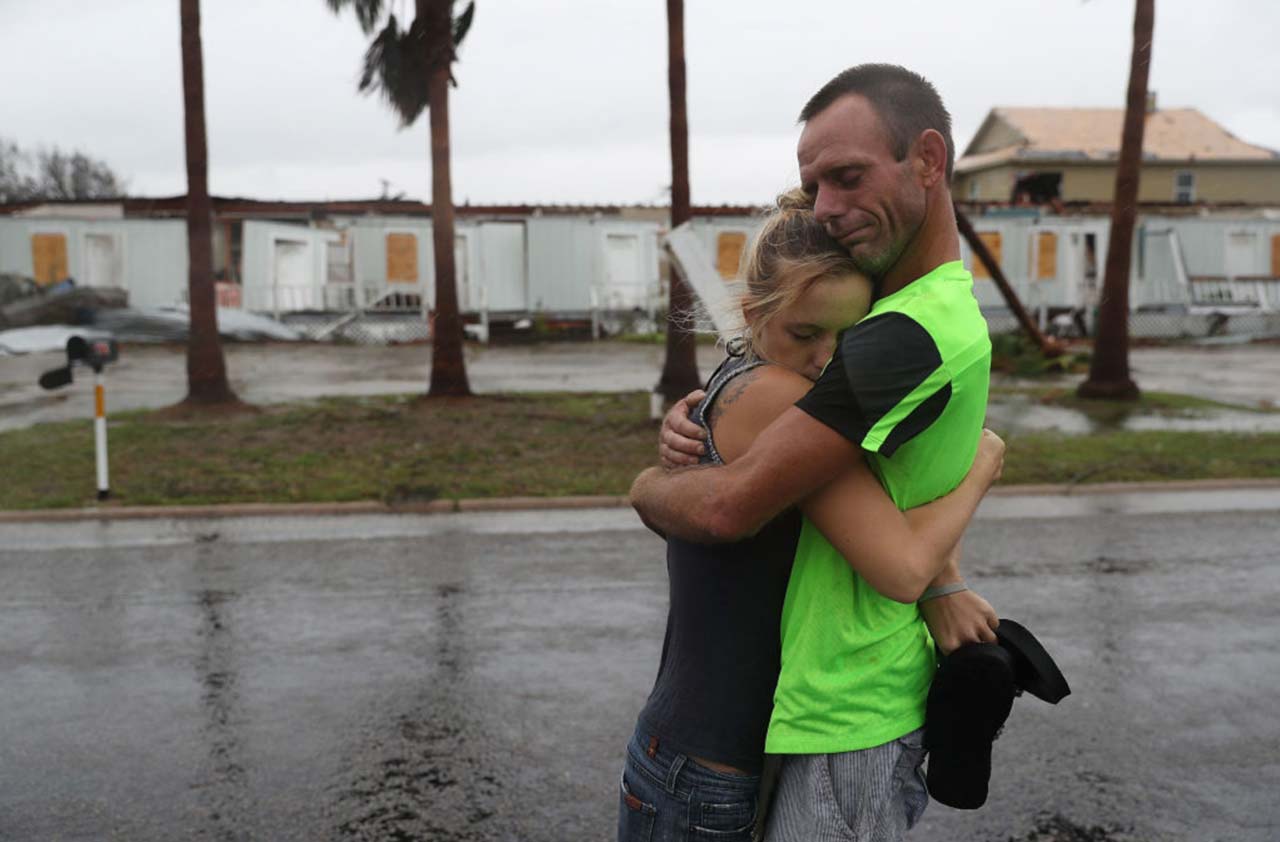Hit Hard by Hurricane? Tapping Your 401(k) May Not Be a Great Idea
The IRS recently relaxed some rules related to hardship distributions from retirement accounts to make it easier and faster for hurricane victims to get money. However, hardship distributions come with costly strings attached.


Profit and prosper with the best of Kiplinger's advice on investing, taxes, retirement, personal finance and much more. Delivered daily. Enter your email in the box and click Sign Me Up.
You are now subscribed
Your newsletter sign-up was successful
Want to add more newsletters?

Delivered daily
Kiplinger Today
Profit and prosper with the best of Kiplinger's advice on investing, taxes, retirement, personal finance and much more delivered daily. Smart money moves start here.

Sent five days a week
Kiplinger A Step Ahead
Get practical help to make better financial decisions in your everyday life, from spending to savings on top deals.

Delivered daily
Kiplinger Closing Bell
Get today's biggest financial and investing headlines delivered to your inbox every day the U.S. stock market is open.

Sent twice a week
Kiplinger Adviser Intel
Financial pros across the country share best practices and fresh tactics to preserve and grow your wealth.

Delivered weekly
Kiplinger Tax Tips
Trim your federal and state tax bills with practical tax-planning and tax-cutting strategies.

Sent twice a week
Kiplinger Retirement Tips
Your twice-a-week guide to planning and enjoying a financially secure and richly rewarding retirement

Sent bimonthly.
Kiplinger Adviser Angle
Insights for advisers, wealth managers and other financial professionals.

Sent twice a week
Kiplinger Investing Weekly
Your twice-a-week roundup of promising stocks, funds, companies and industries you should consider, ones you should avoid, and why.

Sent weekly for six weeks
Kiplinger Invest for Retirement
Your step-by-step six-part series on how to invest for retirement, from devising a successful strategy to exactly which investments to choose.
The recent hurricanes in Texas, Florida and Puerto Rico have been devastating. Recovering from the storm damage is a daunting, and potentially very expensive, task. Those without robust emergency savings accounts are facing some tough decisions about where to find the resources to pick up the pieces. One place people may be looking at is their retirement plan, but that could be a big mistake.
The IRS has announced the removal of restrictive rules and procedures for withdrawals from employer-sponsored retirement plans (e.g., 401(k) and 403(b) plans) for hurricane victims. The removal of these hurdles will make it easier for these individuals, and their relatives who can take distributions from their own plans, to withdraw funds to pay for damages and related expenses. But that doesn’t mean you should do it.
The relief provided only relaxes the procedural and administrative rules related to withdrawals. It does not provide any tax relief. The IRS has stated that these withdrawals will still be subject to income tax and, if applicable, penalties. Even with the ability to access these funds, retirement plan participants affected by the hurricanes should strongly consider exhausting other funds first, and should use hardship withdrawals from retirement plans as an absolute last resort.
From just $107.88 $24.99 for Kiplinger Personal Finance
Become a smarter, better informed investor. Subscribe from just $107.88 $24.99, plus get up to 4 Special Issues

Sign up for Kiplinger’s Free Newsletters
Profit and prosper with the best of expert advice on investing, taxes, retirement, personal finance and more - straight to your e-mail.
Profit and prosper with the best of expert advice - straight to your e-mail.
Qualifying for Hardship Distributions
The special rules the IRS announced are designed to help people who need emergency funds get them faster than they normally would.
The rules for obtaining hardship withdrawals, in general, can be substantial. Normally, the only way for an employee to obtain a withdrawal from an employer-sponsored retirement plan is for it to qualify as a hardship withdrawal or to take a loan, except for unique cases.
Although hardship withdrawals and loans are permitted by the IRS, plans are not required to provide them. Someone who wants to take a hardship withdrawal would need to check with a benefit or plan administrator to see if the plan allows for it. Many plans do not.
Even if hardship withdrawals are permitted, they are allowed only for an “immediate and heavy financial need” and are limited to the amount necessary for that need. Not all expenses qualify. For example, funds to provide for temporary housing and food will likely not qualify, while money needed to repair damage to the employee’s home will. The IRS also requires that the plan sponsor retain thorough documentation.
Downsides of Hardship Distributions
What’s more, hardship distributions are subject to income taxes, unless they consist of Roth or after-tax contributions. Each dollar withdrawn from a retirement plan is generally taxed as ordinary income. Withdrawals may also be subject to a 10% penalty on early distributions, for those under age 59½.
In addition, hardship withdrawals put a permanent dent in your retirement account, because employees who take them cannot later repay them to the plan or roll them over to another plan or an IRA. And those who take a hardship distribution are banned from being able to make additional contributions to the plan for a six-month period. The effect of those restrictions is worsened by the loss of compounding growth for the amount withdrawn.
A Better Choice: Borrowing from Yourself
Hopefully, you have a robust savings account for emergency situations. If not, a better option than obtaining a hardship withdrawal might be to a take loan from the plan. The law allows you to borrow up to $50,000, or half your vested balance, whichever is less. Loans, though, typically need to be repaid (with interest) within five years to your account. And if you lose your job, they need to be repaid immediately, something to really think about if you’re in an industry where layoffs are common.
One big advantage of taking a loan from your retirement account is that when you pay it back, you’re paying yourself back. When you’re done, your retirement account is made whole again, and the growth you’ll see from compounding will be magnified because of it.
Conclusion
Although the IRS has provided special rules that make it easier for hurricane victims to obtain hardship distributions from an employer retirement plan to pay for expenses and repairs, such withdrawals should be made very thoughtfully. This is especially true since the IRS did not provide any tax relief for these types of distributions. If possible, use other sources of funds first, and then take loans from retirement plans.
The damage from the hurricanes has been immense. Don’t allow this disaster to damage your retirement, too.
Profit and prosper with the best of Kiplinger's advice on investing, taxes, retirement, personal finance and much more. Delivered daily. Enter your email in the box and click Sign Me Up.

Daniel Fan is a Partner in the Orange County office of Cerity Partners, LLC. He is an attorney with over 20 years of experience as a high-net-worth wealth planner and specializes in evaluating and optimizing clients’ financial situations to help them obtain their financial goals. Dan has extensive experience in areas such as income and estate tax, business succession, risk management/insurance and retirement planning.
-
 Nasdaq Leads a Rocky Risk-On Rally: Stock Market Today
Nasdaq Leads a Rocky Risk-On Rally: Stock Market TodayAnother worrying bout of late-session weakness couldn't take down the main equity indexes on Wednesday.
-
 Quiz: Do You Know How to Avoid the "Medigap Trap?"
Quiz: Do You Know How to Avoid the "Medigap Trap?"Quiz Test your basic knowledge of the "Medigap Trap" in our quick quiz.
-
 5 Top Tax-Efficient Mutual Funds for Smarter Investing
5 Top Tax-Efficient Mutual Funds for Smarter InvestingMutual funds are many things, but "tax-friendly" usually isn't one of them. These are the exceptions.
-
 Social Security Break-Even Math Is Helpful, But Don't Let It Dictate When You'll File
Social Security Break-Even Math Is Helpful, But Don't Let It Dictate When You'll FileYour Social Security break-even age tells you how long you'd need to live for delaying to pay off, but shouldn't be the sole basis for deciding when to claim.
-
 I'm an Opportunity Zone Pro: This Is How to Deliver Roth-Like Tax-Free Growth (Without Contribution Limits)
I'm an Opportunity Zone Pro: This Is How to Deliver Roth-Like Tax-Free Growth (Without Contribution Limits)Investors who combine Roth IRAs, the gold standard of tax-free savings, with qualified opportunity funds could enjoy decades of tax-free growth.
-
 One of the Most Powerful Wealth-Building Moves a Woman Can Make: A Midcareer Pivot
One of the Most Powerful Wealth-Building Moves a Woman Can Make: A Midcareer PivotIf it feels like you can't sustain what you're doing for the next 20 years, it's time for an honest look at what's draining you and what energizes you.
-
 I'm a Wealth Adviser Obsessed With Mahjong: Here Are 8 Ways It Can Teach Us How to Manage Our Money
I'm a Wealth Adviser Obsessed With Mahjong: Here Are 8 Ways It Can Teach Us How to Manage Our MoneyThis increasingly popular Chinese game can teach us not only how to help manage our money but also how important it is to connect with other people.
-
 Looking for a Financial Book That Won't Put Your Young Adult to Sleep? This One Makes 'Cents'
Looking for a Financial Book That Won't Put Your Young Adult to Sleep? This One Makes 'Cents'"Wealth Your Way" by Cosmo DeStefano offers a highly accessible guide for young adults and their parents on building wealth through simple, consistent habits.
-
 Global Uncertainty Has Investors Running Scared: This Is How Advisers Can Reassure Them
Global Uncertainty Has Investors Running Scared: This Is How Advisers Can Reassure ThemHow can advisers reassure clients nervous about their plans in an increasingly complex and rapidly changing world? This conversational framework provides the key.
-
 I'm a Real Estate Investing Pro: This Is How to Use 1031 Exchanges to Scale Up Your Real Estate Empire
I'm a Real Estate Investing Pro: This Is How to Use 1031 Exchanges to Scale Up Your Real Estate EmpireSmall rental properties can be excellent investments, but you can use 1031 exchanges to transition to commercial real estate for bigger wealth-building.
-
 Should You Jump on the Roth Conversion Bandwagon? A Financial Adviser Weighs In
Should You Jump on the Roth Conversion Bandwagon? A Financial Adviser Weighs InRoth conversions are all the rage, but what works well for one household can cause financial strain for another. This is what you should consider before moving ahead.